Mental! - The Music Quiz

Synopsis
Dunno when Play UK (didn't it used to be UK Play?) started quiz shows but given that it's a music and comedy channel then a music quiz is a good place to start. Actually, it's very handy that it's called Mental! - The Music Quiz because otherwise we'd confuse it with, uh, the 12 other music quizzes we list in these fine pages.
So, what of the format? Surprisingly sparse, actually. Six complete chart addicts are given a board of eight topics from which to choose. On each contestant's turn, they can choose to ASK or BE ASKED a question by one of the other contestants about any of the bands or themes listed on the board.
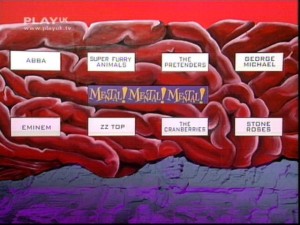 The Mental categories board (using cardboard trilons - Jeopardy this is not)
The Mental categories board (using cardboard trilons - Jeopardy this is not)The contestants have to make up the questions themselves on the spot. To add to the jollity, they don't even have to know the right answers themselves. If the person answering the question gets the right answer, they get 10 points otherwise the questioner gets the 10 points UNLESS there's a significant error in the question. The questions asked are surprisingly interesting given that the contestants come out with them almost on spec, although quite a few others revolve around the "What was Shed Seven's first top 10 hit?" variety.
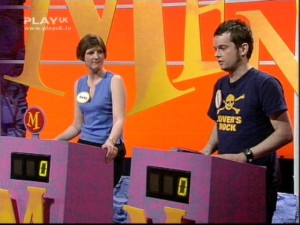 A contestant sets a poser for another contestant (well, it saves money on question writers)
A contestant sets a poser for another contestant (well, it saves money on question writers)If the answerer of the question doesn't believe that the questioner knows the correct answer, they can reverse it back for some "15 points either way" malarkey.
In order to compensate for the last players having fewer topics than the first, the second round is played in the same way but in reverse order. The two lowest scorers are turfed out.
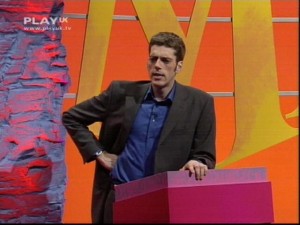 Host, Iain Lee
Host, Iain LeeThe third round is played in pretty much the same way with the remaining four players. In the event of a tie at any stage, a topic is announced (e.g. Bands with modes of transport in their title) and the relevant players have to keep naming examples in that category until they make a mistake or can't think of any more.
The two finalists play in the head-to-head using a string of predetermined categories (i.e. there is no choice) but they do have the benefit of their Brain Card which can double their points on one of the questions.
The winner of the show wins a snazzy music system and the highest scorers go onto some high-score board thing where they can win a place in the final and fight for the title of Mental Music Champion 2001.
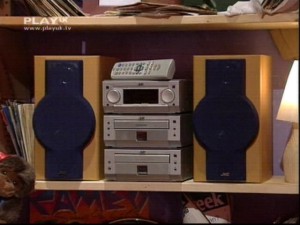 It's a stereo system. You knew that really.
It's a stereo system. You knew that really.Iain Lee's a strange choice for a host. His street cred borders somewhere just above "Geography Teacher" and the scripted gags fall on their arse in a manner very familiar to anyone who's ever watched the 11 O'Clock Show on Channel 4. That said, his banter with the two judges (that check the answers) works well and he does seem to know his stuff in the music department.
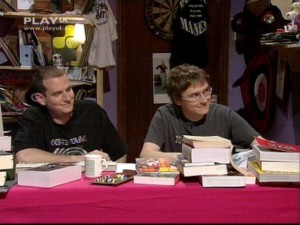 The judges in their den
The judges in their denThe play-along factor in this show is virtually non-existent. You'd have to have a seriously musicological (is that a word?) memory to know enough stuff about the Inspiral Carpets, Chuck Berry, Depeche Mode and Atomic Kitten to ask and/or answer questions on it. However, it is strangely interesting watching the contestants play the game.
On the downside, the set is rather uninspiring and the atmosphere is a little empty. However, on the whole this ain't a bad show if you watch it a few times. The concept of having the contestants make up their own questions is a good one and they have managed to get it to work. Overall, it's a grower.
Catchphrases
"...no, not really, I was just being Mental"
Trivia
We think that, until Welsh-language darts quiz Oci Oci Oci! some seventeen years later, Mental! was the last new game show to use seven-segment LED displays for the scores - so common in the eighties and nineties, but giving way to newer and more sophisticated pieces of technology by 2001.
Iain Lee told the Independent on Sunday in January 2005, "I only did it because I was convinced I'd never get to do TV again. It was a terrible, terrible show. Just wretched. That was the end of my career, as far as I was concerned."
Videos
A full episode from the show.

